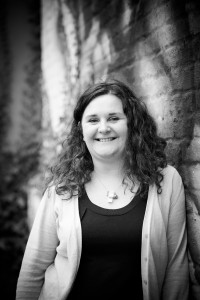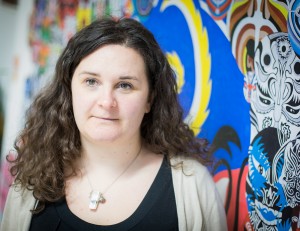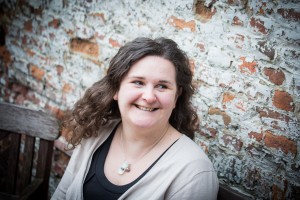Natalie Kontoulis is the Communications and Advocacy officer of the END FGM European Network. She had previously been working on European policy for the UK government and as a translator at the European Commission.
“I realized that I wanted to work on Human rights and gender issues. The issue of FGM really interested me, it was something that I became passionate about because I saw it as a very extreme form of gender-based violence. On a more personal note, I had a boyfriend who was from Guinea. We had never spoken of FGM.”
One day Natalie goes with her boyfriend to watch “Desert flower” at the cinema. When they came out from the theatre her boyfriend was very upset. “I asked him if he was ok, and he told me that his mother and his sisters had undergone FGM. He had known that his older sister had had complications but he hadn’t realized at the time how bad it was, that it caused so many health problems and trauma. It was a big and difficult moment for him. I think he felt guilt for not realizing it and lack of control for not being able to do anything about it. It was also a revelation for me because I realized that you can be living a very “European” international continental life and be touched by FGM without knowing about it. This personal experience made me realize how important it is that everyone knows about FGM”.
“My ex now has a daughter. I asked him about FGM and he said ‘she will never undergo it’. It’s a bit difficult for him to make a difference in Guinea, because he’s so far away…Some people tell him ‘you’re living abroad, you’ve been brainwashed, we’re not listening to you’…”
How do you personally position yourself in the work against FGM?
“As a white European I would not go into a community and try and change anyone’s mind, or work directly to change anyone’s mind, I think it’s much more appropriate, and much more effective and relevant for someone from that community to try and change their opinion. Having said that I think there is a role for everyone to say ‘this is a Human rights violation and I stand against it’. I think it’s very important to see this as a Human rights issue and not a cultural issue, even though culture is of course a big part of it. We all have a right to act against it and to try to do something about it. We’re just not all going to do this in the same way. Whilst it’s appropriate for me to do advocacy at national or EU level, or to train professionals, it’s appropriate for someone else to work with their communities to try to change it.”
A Network born out of a Campaign
The END FGM network was born out of the Amnesty End FGM campaign, which ran from 2009 to 2014. Natalie joined the Campaign in 2014 first as an intern and then as the Communications officer. “When the Campaign was launched its main objective was to get FGM on the European agenda, the interest among decision makers was very very low at the time, so we wanted to get it on the agenda and to do some gender mainstreaming and mainstreaming of gender based violence (GBV) in EU policy and within that, getting FGM into this issue of gender-based violence.”
The campaign was very effective. The European Commission came out with an action plan specifically on FGM in 2013, FGM was included in the Victims’ rights directive, in the EU Asylum directives, in the Istanbul convention… When the Campaign ended 11 out of 15 partner organisations decided to continue the work within a Network. Thus, the END FGM European network was created in January 2015. Today it has 15 member organisations from 11 countries. “The members are very diverse: very small organisations that work directly with professionals, community-based organisations that work entirely with volunteers, organisations that work specifically on development issues… Our members work on a day-to-day basis with the affected communities but also on advocacy.”
The Networks Board has six members spread out across Europe and a secretariat with three paid staff and one intern, based in Brussels. “The network is really the baby of the founding members. The secretariat are responsible for planning and strategy but the members always have an active part in this, we are representing their needs and they know best what are the needs of those affected by FGM.”
A holistic approach emphasising Prevention and Protection
The END FGM adopts a holistic approach to FGM as a form of gender-based violence. “We think that FGM needs to be mainstreamed as a Human rights issue and an issue of gender-based violence. It is crucial for us that FGM is seen as part of the spectrum of Human rights violations and discriminations that women and girls face. It’s one type of Gender Based Violence. Also, it happens in Europe and many other parts of the world, it’s not only ‘an African problem’. FGM needs to be mainstreamed into education, professional training, such as asylum workers.“
The emphasis is put on Prevention, Protection and Integrated Policies. “The fourth P of the Istanbul convention, Prosecution, is also a part of our work, but we really emphasise prevention and protection because by the time you come to prosecution you have already failed basically… It’s the last recourse really. That said, there are also barriers to prosecution that need to be removed”.
“But it can be a huge challenge to get people to understand why prosecution is not our main strategy. For some stakeholders prosecuting makes them feel active, like they are doing something. The challenge is to explain why FGM is so complex and how persecution can lead to secondary stigmatisation. The solutions that we are advocating for involve long-term training, long-term funding, long-term work with communities… these are hard to sell because you don’t see results straight away and one of the challenges with FGM is how difficult it is to have tangible results on the table.”
What are the main objectives and activities of the END FGM Network?
“Today FGM is on the European agenda. The role of the Network is to keep it there. Right now a lot is going on at national and European level. With the migration crisis and the financial crisis there’s a lot of pressure to try and save money, to focus on labour and employment and finance, and less on Human rights and social rights in general. It’s a challenge for us to keep gender-based violence and FGM on the agenda. The asylum crisis makes mainstreaming GBV into policy even more important… We also try to make sure that FGM is included in the discussion on the Sustainable Development Goals (SDGs).”
“As a Network we represent the voices of our member organisations at EU level. We work directly and bring about change within European and international institutions such as the European Commission, the European Parliament, the Council of Ministers, the Council of Europe, UNHCR, UN Women… We try to get FGM included in important policy and as part of the decision making. We also need to make sure that conventions and directives are implemented and translated into national services and legislation. That the promises are kept.”
“We try to build our members’ capacities, adapting to their needs and to what they want. Our job is to try to help them to understand what is going on at an EU level and to interpret that into their national levels so that they can more effectively demand the appropriate services and provisions from their governments. It is a challenge because our members are very diverse and some have limited resources. We also try to help them communicate about their work because a lot of them are doing great work but they don’t make time to communicate on it.”
The Network publishes various guides and tools. It published a guide on the Istanbul Convention and is currently drafting another guide for the Victim’s Rights Directive and the EU Asylum directives to explain how these pieces of legislation can be used as a tool to end FGM. It also organises conferences and events. Recently the END FGM European Network organised a conference on the best interests of the child in FGM related cases.
“We are reflecting on the best interests of the child, what is it? For example in regard to prosecution? It is very difficult. What might be in the best interests of one child is not necessarily what is in the best interests of all children that will follow behind… So what should we prioritize?”
“Another of our main activities is to make sure that professionals are well trained, whether it be teachers, medical professionals, social workers… That’s why we need to have strong links with those professional organisations and bodies. We need them to have gender and more specifically GBV mainstreamed into their training courses. We support them and help them to link to each other. In terms of reporting cases of FGM, professionals are still hesitant. I think they are a bit scared about reporting because they might feel that it’s not their role, that they don’t understand FGM, as if they are afraid it might be racist to deal with it… It is so important that they are well-trained, so that they can also be supported through this process”
What main challenges does the Network face today?
“Getting adequate and long-term funding is a big challenge. FGM is a global issue, we are reflecting on how to work with the diaspora communities in Europe and with communities around the world. The problem is that European funding is either given for issues that are internal to the EU or issues that are external to the EU. We are advocating the need to work cross-continentally to stop FGM and to adopt the funding methodology to the reality of the ground.”
“One challenge in our policy work is to keep close partnerships with all main political parties represented in Europe because FGM is not a party political issue, it’s a Human rights violation. It can be difficult when one has limited resources in terms of time and money not to only work with those who are already engaged but to approach those who don’t understand yet.”
“Another issue is the current big back-lash that we see on asylum and migration. FGM does get linked to these issues and it can be an opportunity in the sense that we can call for the importance of having a gender-, child- and culture sensitive approach to asylum. But it’s also a threat, linking asylum directly to FGM can work negatively to those affected by FGM. We see how other types of gender based violence are hidden under those that affect the migrant populations, such as FGM. Some politicians instrumentalize these issues and tend to willingly ‘forget’ the fact that all women face gender-based violence…”
“One of our objectives is to contribute to the empowerment of women and girls, and the communities in general. For example, we really try to use non-stigmatizing, empowering language. It’s a challenge when working with certain stakeholders. We need to explain why terms such as ‘barbaric’ are stigmatizing and ostracizing…”
Linking FGM to other SHRH issues…
“Sometimes I think FGM can be a politically ‘easier’ topic than other Sexual and reproductive health and rights issues. A basic thing like Sexual and reproductive health… If you work on abortion it’s incredibly difficult today! Another example is the issue of discrimination and genital mutilation of intersex people which is strongly linked to that of female genital mutilation. There is some political shift on this issue but there is a huge amount of work still to be done. Intersex rights are a question of bodily integrity and I think there is potential to work with specialized organisations and raise this as a larger discussion. Weirdly enough I think it is easier and less controversial to link FGM to the violations faced by intersex persons than to for example male circumcision…. There are several reasons for this: experts and NGOs working on male circumcision don’t always agree, the relation to big world religions, lack of research… Therefore getting buy-in from decision-makers is even harder than on other issues.”
What are the perspectives of END FGM for 2016?
“Our theme for 2016 is Asylum : we are going to be talking a lot about gender sensitive, child sensitive and culture sensitive asylum systems and provision of services. We will also focus on training for professionals and on data collection with a common methodology in all member states. In 2106 the Network is planning to publish the two guides: on the Victim’s rights directive and on the Asylum directives as a tool to end FGM. It will also do a paper on ethical use of language which will be useful for the media and other organisations. The END FGM Network is part of the United to End FGM Web knowledge platform (UE FGM) which provides a training tool for professionals in all fields. The Network is responsible for creating a media module and also for the general dissemination of all the modules. Two Belgian organisations, GAMS and INTACT, are partners of this project. Together they are developing country-specific pages for Belgium. Moreover, GAMS is responsible for two Health modules and INTACT is responsible for two legal modules. “We want to continue building bridges. Working with professionals, with diaspora and affected communities… The newly published UNICEF report is very helpful because it shows what we already knew, that FGM is everywhere. This is not happening to some other community, it’s happening everywhere, including in Europe. We are all affected by it.”




